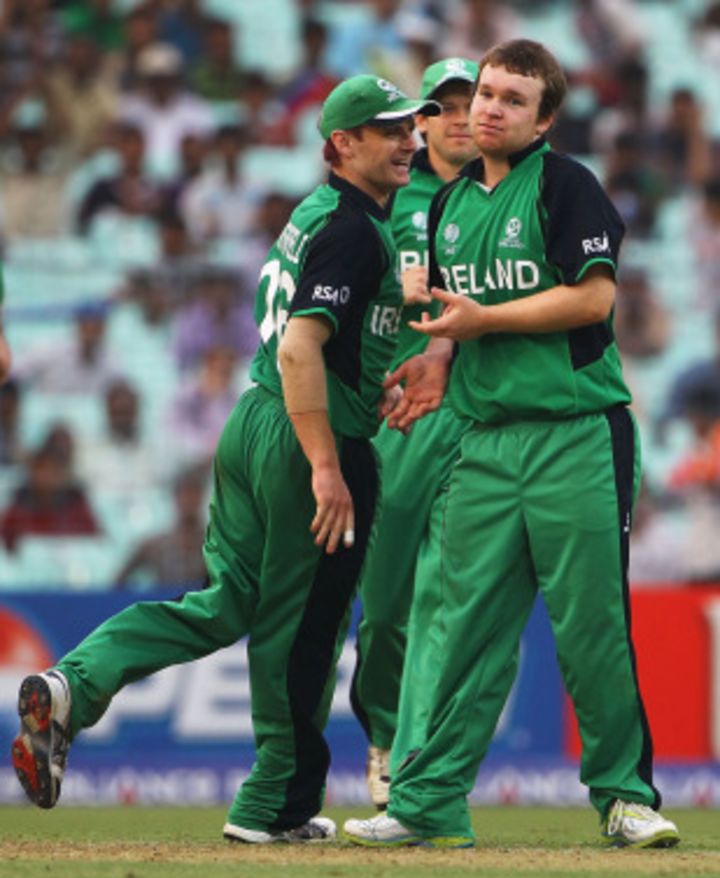Associates hope for World Cup lifeline
Associate nations will discover whether they will be given a chance to appear at the 2015 World Cup when the structure of tournament is debated once again at the ICC's annual conference

Associate nations will discover whether they will be given a chance to appear at the 2015 World Cup when the structure of tournament is debated once again at the ICC's annual conference, which begins on June 26 in Hong Kong. Some countries believe they have put together an irresistible argument to be reinstated, but a lingering fear remains that they will be frozen out.
"It would take a brave group to completely ignore the views of their most important stakeholders - the players, the fans, their own committees and members," Warren Deutrom, the Cricket Ireland chief executive, told ESPNcricinfo. "All the anecdotal evidence points towards a degree of hope, but then again nothing has really changed since the original decision."
Yet worries remain that the Full Members, who are often seen as looking after their own welfare first, won't have changed their minds, especially as the 2015 event in Australia and New Zealand has been set at 10 teams. "It's a major concern that it's the same people making the decision," Tom Sears, the Cricket Kenya chief executive, said. "But the ICC president has made it very clear that if they go against the recommendation of the cricket committee then what's the point in having it? With the weight of opinion against them I think it would be a ridiculous decision not to change."
The initial decision to restrict the next World Cup to the ten Full Members created a fierce backlash and threats of legal action against the governing body. The ICC was accused of operating a closed shop and phrases such as "a black day for the sport" were heard. After two weeks of silence Sharad Pawar, the ICC president, asked that the issue be examined again and the ICC's own cricket committee recommended there should be a qualifying tournament when they met at Lord's last month.
Haroon Lorgat, the ICC chief executive, said his preference was for the tournament to remain 10 teams but with an element of qualification. The final decision, however, rests with the same group of people that voted the first time, so there is no guarantee the Associates will be included.
Deutrom, though, believes the support behind the Associates' stand is making those administering the game reconsider. "I think for the very first time the directors - the ten Full members - have seen it is a sport that has 105 countries," he said. "They understand their duty is as custodians of a truly international sport. The ground swell of opinion has reflected that cricket is truly global and therefore the voices of the 95 other countries must now be heard and decisions should not wholly be based on the interests of 10 countries."
Ireland, largely because of their standing as the leading Associate nation, are one of the loudest voices demanding a change from ICC. They famously beat England in Bangalore during the 2011 World Cup, but Deutrom doesn't want any decision to be weighted heavily in their favour at the expense of the wider Associate and Affiliate structure. Instead, he wants Ireland to be used as an example of what smaller cricket nations can achieve when given the backing needed to progress.
"I think why Ireland have been at the forefront of this is because it's the Irish performances that have provoked the debate," Deutrom said. "I've been at pains to stress this is about 95 countries even if Ireland helped improve the argument. Look at Afghanistan, for example, who climbed the World Cricket League structure. It's not just an Associate argument.
"Afghanistan's performances have given a hallmark of what every country can aspire to, that's the beauty of World Cup qualification. We've always talked about the pathway, that's the most sacrosanct thing."
A positive sign has been the creation of an ODI league, which will run parallel to the four-day Intercontinental Cup, and could provide a qualifying path to the World Cup, although it remains to be seen how extra sides would be accommodated in 2015. And that means consideration has to be given to the decision not being overturned.
A qualification process has been promised for the 2019 World Cup in England, but there's no sign of Associates backing down and waiting another four years. "We hope the result goes well but we've also examined the legal position," Sears admitted. "It would be a last resort but at this stage I wouldn't rule anything out."
A leading sports lawyer told ESPNcricinfo that countries like Ireland could have a strong case to go to court. "The biggest issue concerns the way it's been done," he said. "There are commercial justifications in moving to ten teams, and those in themselves would make it legal. However, the complete exclusion of the Associate members could only be done in a way where there were justifications, and the changes were brought about in a proportionate manner.
"Unless the ICC can show some strong objective evidence as to why a qualification tournament would be practically impossible because of fixture overload or FTP commitments, they wouldn't have a strong leg to stand on."
Deutrom, meanwhile, hopes the sport isn't put in such a position. "I think it would be wholly irresponsible of the board to go down that route. I sincerely hope they don't place the sport in a position where we have to test the governing body's decision. I hope, and I trust, that the right decision will be made."
Andrew McGlashan is an assistant editor at ESPNcricinfo
Read in App
Elevate your reading experience on ESPNcricinfo App.